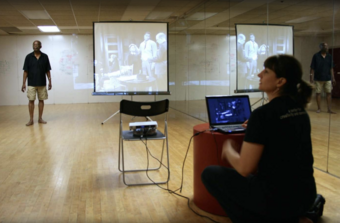Towards a Small Theatre
Once, in the lobby of the Public Theater, I was introduced to a New York playwright as being from Minneapolis. The fellow playwright’s response was, “Why?” with a tone I can only describe as Thurston Howell-esque. (Maybe that’s a new YouTube sensation - “S*** New Yorkers Say to Midwesterners”?)
I might’ve even responded, “It’s a very livable city.”
And it is.
There isn’t as much new work happening here as there should be. It’s baffling to me that the Guthrie or the Jungle haven’t produced an Allison Moore, Carson Krietzer or Melanie Marnich play. I believe I did a spit-take of my breakfast cereal when I read the Guthrie describing their commitment to new plays in a press release announcing the premiere of the adaptation of The Great Gatsby. (You think I’m kidding - read Joe Dowling’s quote). I agree that the Fringe factor is something that’s unique to Minneapolis. People LOVE the Fringe here, often at the expense of theatre that takes place in the other eleven months that aren’t August. Kevin Kling has started to do an annual “not-Fringe” show, after being a Fringe fixture, I assume because he didn’t like the restrictions, the short run, the lack of a set etcetera (But he’s so Minnesotan, he would never complain…).
Regional theaters were born because professional actors wanted to live a life outside of New York and it was a game-changer. So what’s the next model and how does it pertain to playwrights?
But Minneapolis’s playwriting stamp is everywhere - how many of the emerging and/or emerged playwrights in New York and beyond have made a pass through the Twin Cities? Kristoffer Diaz, Sheila Callaghan, Janet Allard, Lisa D’Amour, Deborah Stein, David Adjmi, Peter Gil-Sheridan, Jordan Harrison, Naomi Iizuka, Vince Delaney, Steven Dietz, and the list goes on. Then there’s the truly local talent, people who have made their lives here for decades: Kira Obolensky, Jeffrey Hatcher, John Olive, Carlyle Brown, Aditi Kapil, among others. There have been years at Humana where you can’t swing a stick without hitting some frickin’ Twin Cities expatriate. I even had a national theater critic lament to me, “What is it about Minneapolis?!” because the American Theater Critics Association kept bestowing the Primus Award to some deserving playwright, only to discover they had given it yet again to someone from Minneapolis.
Obviously, we’re doing something right. And that “something” seems to be the amazing support we get from the Jerome and McKnight Foundations and the Playwrights’ Center. But how does that translate to plays being produced locally, organically and sustainably? The small theatres are working plenty hard. Urban Samurai, a plucky, by-the-bootstraps theatre, is producing Slasher by Allison Moore after its Humana run, just as years ago, Tallgrass Gothic by Melanie Marnich was produced by Emigrant Theater (also a sassy, shoestring theatre, now defunct) after premiering at Humana. Carson’s work until recently was produced almost exclusively by Frank Theatre here in the Twin Cities, although Workhaus Collective recently got in the game. Bitching about the Guthrie, while a lot of fun, is about as useful as complaining about campaign finance reform. We all know something needs to change but it feels like a losing battle because big money always makes its own rules. (Can we get Stephen Colbert interested in the fate of emerging playwrights perhaps?)
Regional theatres were born because professional actors wanted to live a life outside of New York and it was a game-changer. So what’s the next model and how does it pertain to playwrights?
Rather than railing at big theatres who will always choose stiff productions of Shakespeare (or even worse, “hip” productions of Shakespeare) over new plays, I think small theatres banding together is the more useful strategy. It’s easy to get clique-y and competitive when you run a small theater. Believe me, as a producer at a small theater, I know. But turf wars don’t help anyone. Have we learned nothing from the 1979 classic The Warriors? Just as trade unions figured out that co-ops were the way to go in the face of increasing industrialization in the 1700s, small theatres interested in new plays have to unite, sharing resources, information and funds. Larger regional theatres have discovered co-productions as a means of producing new plays, what’s to stop smaller theatres from doing something similar so we can share the risk and enjoy the advantages?
The ecology of a small theatre town like the Twin Cities is delicate. But if we don’t want to lose the writers we have, we have to find a way to make it more than livable. We need to make it thriving, flourishing, and vital.











Comments
The article is just the start of the conversation—we want to know what you think about this subject, too! HowlRound is a space for knowledge-sharing, and we welcome spirited, thoughtful, and on-topic dialogue. Find our full comments policy here
All right, Tory! Lucid and clever, as always. Hope your words spark some action.
What a great piece!
It is a beautifully logical solution to the happy problem of many small companies in a community like the Twin Cities. In general, I've noted as a Minneapolis dweller (also an import, by way of the Jerome/McKnight foundation) that there seems to be a greater amount of actor driven theaters here than might be average elsewhere, getting to Cory Hinkle's comment on the low amount of freelance directors. This is an actor/writer town. A stronger presence of directors interested in written works (as opposed to devising with actors) would pull this place to a greater artistic height.
Ian, that's terrific - we have some similar things in place, the MN Theater Alliance comes to mind. I'd love to see small companies with similar or complementary missions co-produce more. It seems like a great way to share audience and resources and make bigger theater together. But I love the idea of a mutual prop library, that's awesome! (where is that prop gun when you need it?)
So far, not a lot of use has come of our prop library-- which is problematic since the storage space is easily the most expensive line on our budget (and there are all sorts of legal regulations regarding the storage of prop firearms-- so we've not gone there.) However, we certainly are working towards a shared audience and knowledge base.
In Boston, a large number of small companies and independent artists have banded together under the banner of the Small Theatre Alliance of Boston (STAB.) We share knowledge, expertise, advertising, and even operate a prop library. It can be done.
http://smalltheatrealliance...
Hey, Tory. Great job. A great continuation of an exciting conversation. Looking forward to more of this...
Thanks, Tory! Great article. So spot on about small theatre companies.
I agree. Although Minneapolis isn't a small theatre town. It is a metropolis.